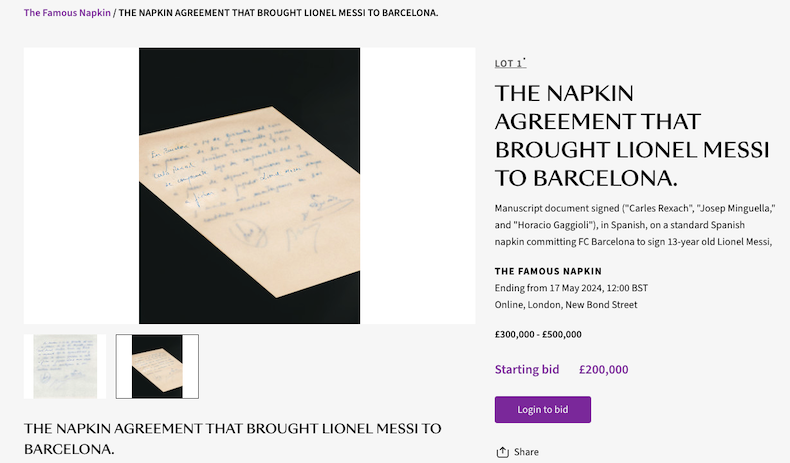Rakewell, Apollo’s wandering eye on the art world, takes a rakish look at art and museum stories.
It was the final to end all finals. A clash of two titans of the game. In one corner stood Lionel Messi, man of the people, cultured veteran and quite simply the greatest player the game has ever seen, desperate, after years of hurt, to win the most prestigious sporting crown of them all. In the other, the young French sensation Kylian Mbappé, a decade Messi’s junior, whose lightning pace and unrivalled finishing are matched only by his towering ego. Those who watched Argentina triumph at the 2022 FIFA World Cup in Qatar can surely agree that it was one of the most electrifying, beautiful games of football ever played.
A more prosaic instance of warring heavyweights has recently come to Rakewell’s attention. A dispute has broken out between Josep Minguella, the Spanish agent who, in 2000, facilitated the signing of then 13-year-old Messi by FC Barcelona – the club with which he would go on to win a staggering 34 trophies and seven Ballon d’Ors over the course of two decades – and the Argentine Horacio Gaggioli, Messi’s agent at the time and the man who brought the young prodigy to the attention of Minguella and the Barcelona hierarchy in the first place. The prize at stake in this quarrel? A humble napkin.
The napkin in question is the one on which Messi’s first contract agreement with Barcelona was scrawled in December 2000. Signed by Miguella, Gaggioli and Barcelona’s sporting director Carles Rexach, the ‘famous napkin’ was put up for auction by Bonhams, on behalf of Gaggioli, in March at an eye-watering estimate of €350,000–€580,000. But this week Minguella has slid in with a crunching last-ditch tackle on Gaggioli, claiming ownership of the napkin and thereby halting the auction in its tracks. As tales of disputed ownership go, it’s not exactly the Parthenon marbles.
The auction listing for ‘the famous napkin’. Courtesy Bonhams

According to Gaggioli, ‘Minguella’s claims are contradictory and aren’t true […] Minguella has never known where the napkin was, because the napkin has never been his. He has always known that the napkin has been in my hands.’ It’s a statement worthy of a more literary instance of napkin-wrangling – the strawberry-spotted handkerchief stolen by Iago in order to convince Othello of his wife’s unfaithfulness. ‘Tis true, there’s magic in the web of it,’ Othello remarks. For half a million euros, you might expect there to be some magic in this disputed napkin, too, though we should hope that this real-life Shakespearean saga doesn’t end with (spoiler alert) murder by asphyxiation. And perhaps it is naive to balk at the high price. The story goes that Picasso was once asked by a waiter to do a doodle on a napkin in lieu of payment, to which the painter replied: ‘I want to pay the bill, not buy the restaurant.’
Rakewell remains hopeful that Gaggioli and Minguella can work out a solution. Carrying on with the auction and splitting the money seems the most logical choice. Or they could take the approach adopted by Cady Heron towards the Spring Fling Queen crown in Mean Girls, and cut the object into pieces to share – a napkin of two halves. Of course, this scuffle could have been avoided had the agreement been signed electronically rather than scribbled on a loose bit of paper. To think, all this because Messi’s agents couldn’t keep a clean sheet.
Got a story for Rakewell? Get in touch at rakewell@apollomag.com or via @Rakewelltweets.




